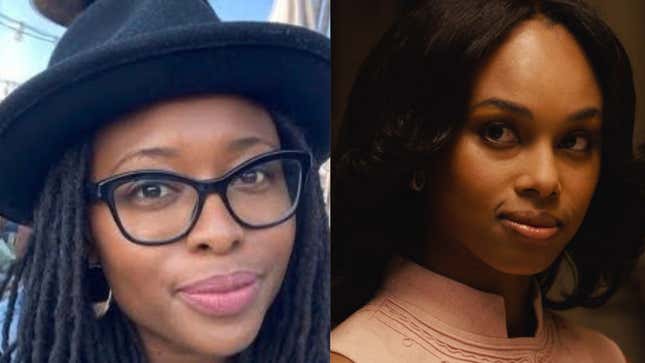
This is Randall Pearson’s birth mother. This is Laurel.
We first meet young Laurel DuBois (portrayed by Jennifer C. Holmes) way back in Season 1, Episode 3 titled, “Kyle.” Through a series of strategically teasing flashbacks, we learn just a little bit more about her character, mostly through the perspective of Randall’s (Sterling K. Brown) birth father William (portrayed in various stages by Jermel Nakia and Ron Cephas Jones).
Warning: Spoilers ahead for Episode 506, “Birth Mother”
Cut to the sixth episode of the fifth season titled, “Birth Mother,” where the audience is taken on an emotional journey with Randall (Sterling K. Brown) and Beth (Susan Kelechi Watson) to New Orleans after finding out that the mother he believed to have died when he was just a baby via a drug overdose actually lived. And what a life she lived.
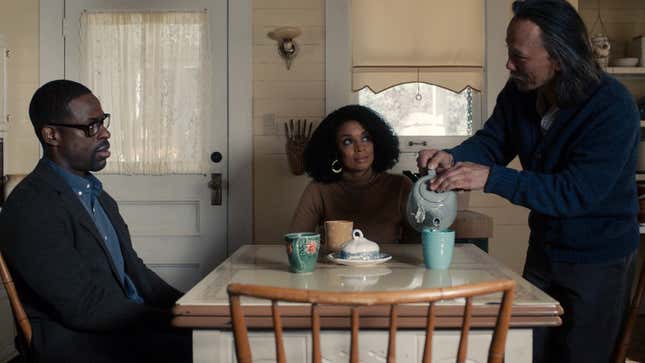
In this episode, we come to know Laurel as “the woman who wasn’t drowning” via one of the great loves of her life, the soft-spoken and gentle Hai (Vien Hong). At the moment, a young Hai (Kane Lieu) attempts to save her from drowning in the lake (quite the meet-cute!), we realize she was actually surrendering—she was letting go of the pain and heaviness that burdened her. In turn, she was floating...she was free.
From the sizzle of her debutante-approved press-n-curl to the “carefree Black girl” that eventually blossoms at Aunt Mae’s (Lisa Gay Hamilton) farmhouse, “Birth Mother” gives us a rich gaze into Laurel’s backstory. While Laurel’s wisdom eventually becomes a vessel for Randall to let go of his own internal demons (as well as finally find the blood connection he’s been searching for), this episode allows her to be a fully realized human.
In a surprisingly endearing phone conversation on Tuesday morning leading up to the episode’s broadcast, This Is Us co-executive producer and writer Kay Oyegun (who co-wrote this episode with Eboni Freeman and made her TV directorial debut via NBC’s Female Forward program) explained just why Laurel’s eventual in-depth reveal was the slow burn that it was.
“You want to build something out to allow it to be special,” Oyegun (who pulled not only from her own life’s elements to write and direct this episode but from her “spirit”) told The Root. “[If we had] given too much about Laurel too early, we’d have to retcon too many things for this episode. But, because we had been so spare with her, this gets to be full and also surprising because it actually changes the way people see her.”
Oyegun’s gorgeous writing is perfectly complemented by Holmes’ portrayal of young Laurel (an older Laurel is portrayed by Angela Gibbs). When you whip those two together, you have a recipe that will undoubtedly cause you to fall in love with her. Holmes also joined our phone conversation, which ended up brimming with so much Black girl love, light and energy, that it carried me throughout the remainder of my busy day. In “Birth Mother,” we get a detailed look into Laurel’s struggles—which include forbidden love, the loss of her beloved brother, drug abuse, incarceration and ultimately never getting to witness her son grow up.
“I had a journal and I journaled as Laurel,” Holmes told The Root, a format that, along with praying, she says made it easier for her not to judge Laurel. “I journaled about ‘my’ relationship with ‘my’ parents and the death of ‘my’ brother and ‘our’ relationship and Aunt Mae. So, that made me ground her even deeper in spirit. I took from my own life, like the relationship with my father, the ups and downs that...you know, the things that I do agree with my father and also [there’s] a lot of things I don’t agree with, so that correlated with Laurel and her relationship with her father. When it got to the use of drugs, Kay told me that [Laurel’s] drug use was driven by grief.”
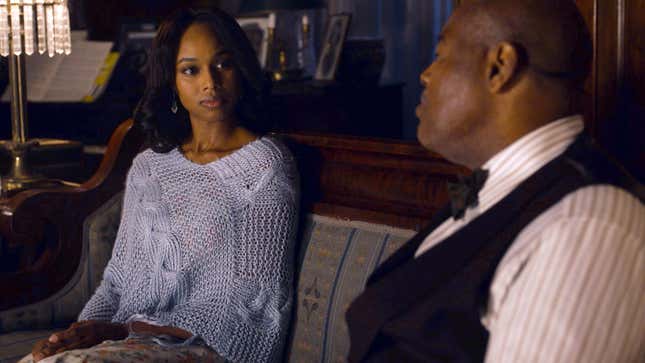
In “Birth Mother,” not only do we see Laurel—we hear her. As Aunt Mae implores her to “let it all out” in a cathartic moment, Laurel’s blood-curdling scream becomes an exquisite release for her character. Watching, I began to sob for her, realizing it was also a release for me. In addition to the general burdens Black women carry in this world, it somehow served as the timely release we all need after the past year (and some of this one too, so far).
In our conversation, Oyegun revealed that the day Philando Castile was killed, she found a private room at work and cried, then went about her day engaging in everyday life—as we do, especially as Black workers who are constantly attacked by racial trauma. Though the This Is Us environment was always open to difficult conversations concerning race (something Oyegun credits to show creator Dan Fogelman’s leadership), this past year took things to another level in a way it never had before. It actually wasn’t until last year that she opened up about this experience to her fellow writers in the room, an experience she called “sobering” for those who had no idea. In that same spirit, I wanted to know if Oyegun and Holmes have since had space to “let it all out” in their own respective ways.
“This episode first came in at 73 minutes and then having to cut down to the meat of a 42-minute network TV show, I think was a feat in a way that I don’t relish,” Oyegun recalled. “All of that is to say that I think my way of letting go is in the sense that I love the Lord and He told me to hand Him my yoke because His is light. And so that’s where I give it. That’s who I hand it to. That’s who I deposit it with.”
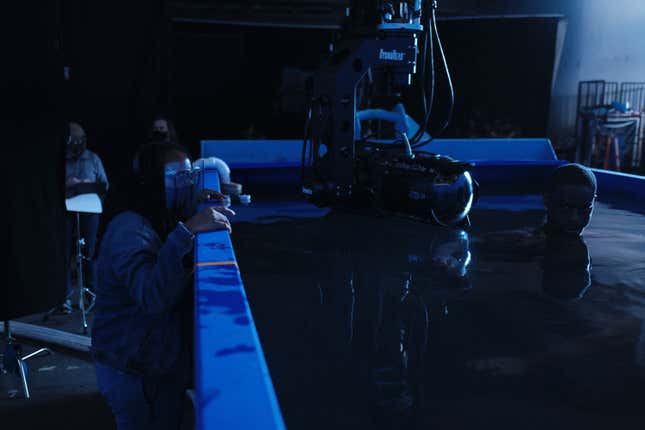
“Everything that we went through this past year and what our ancestors went through...everything...I took all of that [in],” Holmes said. “[A]ll of that frustration, sadness and everything that I went through personally...everyone that I know [such as] my relatives and strangers.... I already knew I was yelling for them. I was letting it go for them as well.”
There is a healthy trust and mutual respect between Oyegun and Holmes that is clearly reflected onscreen—the way Holmes gives so much of herself to Laurel (also, to note, Brown’s gut-wrenching unraveling and eventual rebirth at the end of the episode). It’s readily apparent that Oyegun created a safe space on set for her actors.
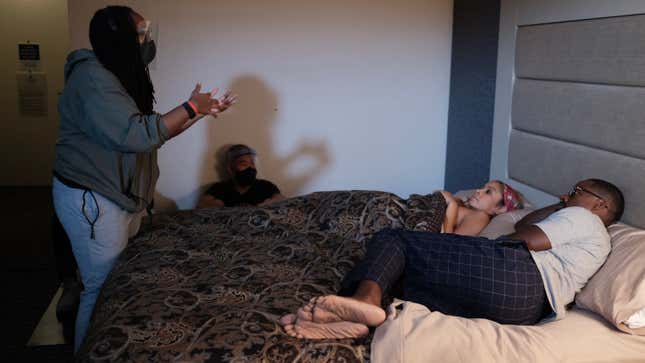
“I’m just going to be comparing my experiences that I had with Kay with everyone else, because she made it so special,” Holmes said. “She listens. Sometimes, when I wasn’t able to get there [emotionally within a scene], she would come to me and was so intimate and she would talk to me. And the moment she talked, emotions would just come out of me.”
Toward the end of our call—which had become more like a wonderful Black girl communal love-fest than an interview—, Oyegun poured into her rising star Holmes with a message that I think every Black girl should take in and let it resonate with them.
“God has blessed both of your hands and you are gifted,” she said.
Indeed. God bless the woman who wasn’t drowning.
This Is Us airs Tuesdays at 9 p.m. ET on NBC.

